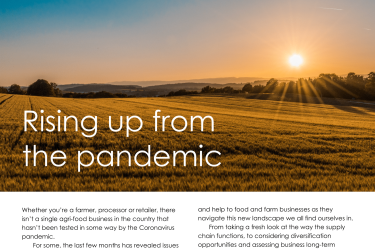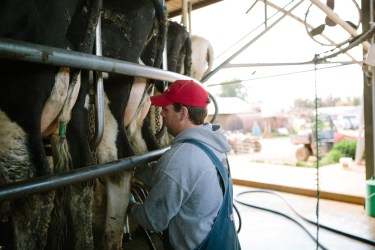By Tim Harper
Covid-19 has placed the dairy sector across the world into uncharted territory. The key impact has been the closure of hotels, pubs and restaurants, together with the likes of sporting events, hospitality, educational establishments etc. This led to the overnight ending of demand for all the products they purchase, including dairy.
Offsetting this, there was an initial surge in demand for dairy products sold direct to consumers by food shops. However, once that surge had taken place, total demand fell to much lower levels, as householders used up the stocks they had purchased earlier. We do not yet know what the impact on total dairy demand will be, but it is generally considered that the additional retail sales will not compensate for the near total wipe out of that from the food service sector.
There are many reports of dairy products shortages in supermarkets and frustration that demand cannot be fully met. Unfortunately, as processors making goods for the food service sector are highly specialised, in most cases, it is not easy or quick for them to shift from making one dairy product to another.
For example, a factory packing liquid milk into large pergolas for vending or hospitality cannot easily switch to the smaller containers demanded by retail buyers. UHT milk is incredibly scarce on supermarket shelves but the UK only has a few factories geared up to produce it. As it requires specialist equipment that would take months to install, even in normal circumstances, this is demand that simply cannot be met from UK milk.
The reaction from supply chains
This is why there needed to be rationing of some dairy products in store despite the best efforts of the relevant food supply chains to meet demand. Some of this may have been overdone and it is welcome news that most retailers have lifted these restrictions.
Factory output may also be affected by potential staffing issues due to workers or the people they live with being affected by Covid-19, and the fact that many of those workers are highly skilled and cannot be replaced in the short term.
The nature of the dairy sector is such that relatively small changes in total supply and demand can have big impacts on farmgate prices. In the current situation, the changes have been magnified by very significant changes in the supply and demand of individual product types and market outlets. To make matters worse, there are challenges in exporting products as markets and supply chains around the world are seriously disrupted.
“creating a tsunami in the marketplace”
This exceptional set of circumstances is creating a tsunami in the marketplace and this is transmitted to the primary raw material. Farmers are bearing a heavy burden as a result. It is the same with other raw materials like oil: the price has more than halved since January.
I do not believe the current situation represents a structural collapse in demand for dairy products that we won’t recover from. Dairy products are enjoyed, form an important part of people’s diets and are a key ingredient in an enormous number of products.
Spring is also now upon us when UK milk supply is at its highest which is magnifying many of the problems today. However, it is the time of year when milk can be produced most cheaply.







